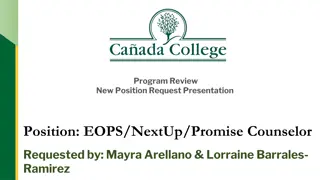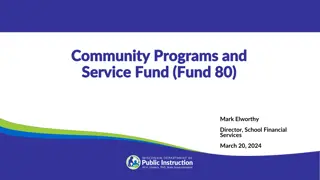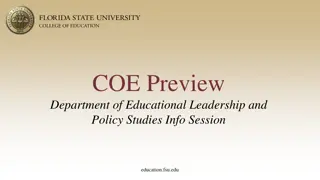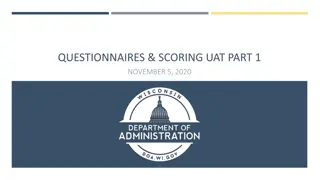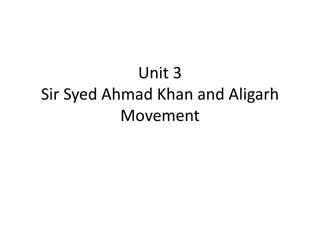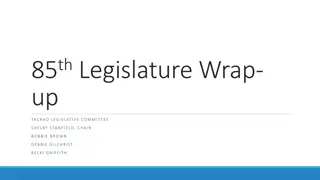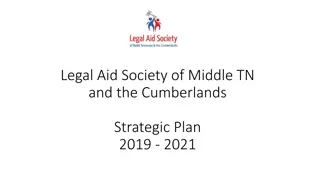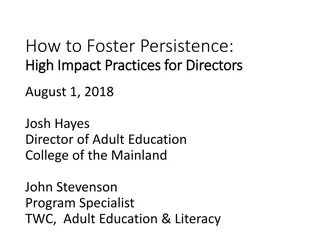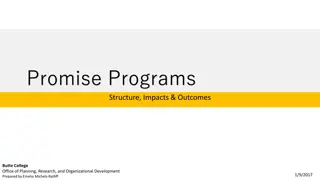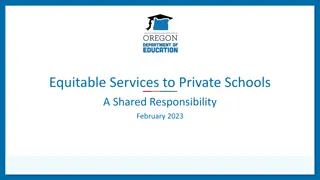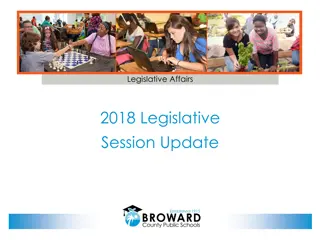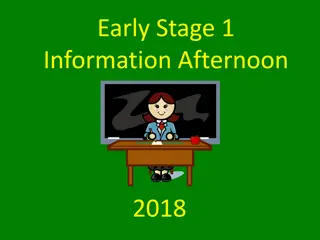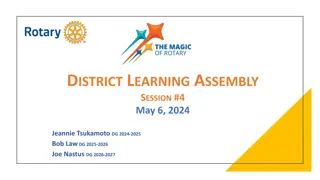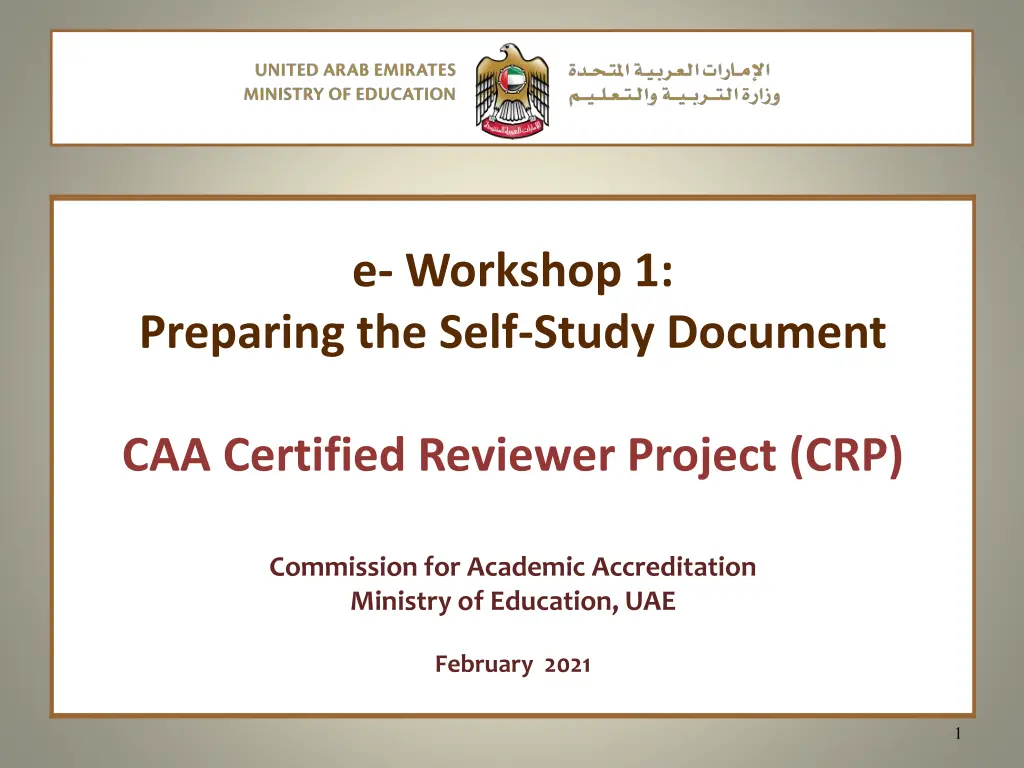
Self-Study Document for CAA Certified Reviewer Project in UAE Education
Dive into the comprehensive self-study document designed for the CAA Certified Reviewer Project in UAE, covering topics like educational programs, student assessment, course delivery, and more. Gain insights into program planning, budgeting, and evaluation for academic accreditation.
Download Presentation

Please find below an Image/Link to download the presentation.
The content on the website is provided AS IS for your information and personal use only. It may not be sold, licensed, or shared on other websites without obtaining consent from the author. If you encounter any issues during the download, it is possible that the publisher has removed the file from their server.
You are allowed to download the files provided on this website for personal or commercial use, subject to the condition that they are used lawfully. All files are the property of their respective owners.
The content on the website is provided AS IS for your information and personal use only. It may not be sold, licensed, or shared on other websites without obtaining consent from the author.
E N D
Presentation Transcript
e- Workshop 1: Preparing the Self-Study Document CAA Certified Reviewer Project (CRP) Commission for Academic Accreditation Ministry of Education, UAE February 2021 1
Session 5: Educational Programs Prof. Aly S. Nazmy Commissioner Commission for Academic Accreditation Ministry of Education, UAE February 2021 2
Session Breakdown Presentation 20 minutes Guest Presenter 20 minutes (Prof. Denise Guerin - University of Minnesota, USA) Q & A/ Discussion 20 minutes 3
Educational Programs (Standard 3) This is Section 2 of the Self-Study and in the ERT Report. The CAA expects that this section address 14 sub-sections as shown in the next slide. 4
Educational Programs (Standard 3) 2.1 2.2 2.3 2.4 2.5 2.6 2.7 2.8 Program Planning and Development Budgeting for Programs Program Structure and Completion Requirements National Qualifications Framework (QFEmirates) Graduate Programs General Education Remedial Courses Internship or Practicum 5
Educational Programs (Standard 3) 2.9 2.10 Student Assessment 2.11 Course Delivery 2.12 Course and Program Evaluation 2.13 Program Effectiveness 2.14 Substantive Change for Programs Teaching Methods Please refer to PP. 17-21 of the PM-RPA 6
2.10 Student Assessment How would you define Student Assessment? Assessment of Student Learning is the systematic collection, review, and use of information about educational programs undertaken for the purpose of improving student learning and development. Source: NATIONAL INSTITUTE FOR LEARNING OUTCOMES ASSESSMENT (NILOA) www.learningoutcomesassessment.org 9
2.10 Student Assessment Why do institutions conduct Learning Outcomes Assessment? Your turn to answer! 10
2.10 Student Assessment Why do institutions conduct Learning Outcomes Assessment? To meet Accreditation Standards. To make sure students receive a high quality education. To make sure students are learning what they need to learn in professional life and careers. To answer questions about institutional practices and the curriculum. Source: NATIONAL INSTITUTE FOR LEARNING OUTCOMES ASSESSMENT (NILOA) www.learningoutcomesassessment.org 11
2.10 Student Assessment CAA Expectations About Student Assessment? The CAA expects that all institutions regularly assess all academic programs to show that students meet the specified learning outcomes. The CAA expects that there is evidence to show that institutions use the results from the assessments for program improvement. The CAA expects institutions to document their institutional effectiveness efforts. 12
Excerpts from the PM-RPA (Sec 2.10) Please refer to page 20 of the PM-RPA 13
Excerpts from the Standards (Stipulation 3.10 pp. 37-38) 14
Closing the Course Assessment Loop Plan What are the course goals and objectives How should the course be delivered Do Conduct the course accordingly Check Carry out student learning assessment Act What improvements/changes do we need to make 15
Requirements format for ERT Report Requirement X: ABC University is required to revise the CLOs of the course to identify competencies that are appropriate and measurable. Requirement XI: ABC University is required to re-write the CLOs of the course and ensure that they meet the expectations of QFEmirates Level 7. Requirement: XII: ABC University is required to provide a revised syllabus for the course that links PLOs, CLOs, and assignments, as well as provides more details on assessment. 16
Suggestions format for ERT Report Suggestion X: The ERT suggests that ABC University reduce the number of assessments for the course and make greater use of case-based learning to achieve CLOs. Suggestion XI: The ERT suggests that ABC University consider adding to the course more writing-intensive, experiential, and active learning activities related to QFEmirates Level 9 descriptors. 17
Thank You! Aly Nazmy aly.nazmy@moe.gov.ae
Practical Session Homework 4: Distance Group Exercise Please refer to Section 2.10 of the Sample Self-Study included in your workshop material. CAA Expectations (Standard 3.10.1) The Institution uses a variety of appropriate assessment tools to ensure that students acquire the specified knowledge, skills and competencies and meet the specified learning outcomes of the course, unit, or module. Each group should answer the following questions: Is there evidence that a variety of assessment tools are used? Is there evidence that both direct and indirect evaluative tools are used? Is there evidence of use of results to make changes? What would you recommend to improve the quality of the program? 19



